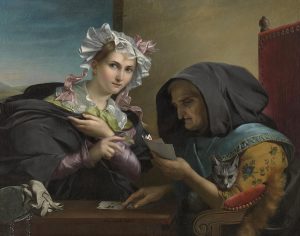Keeping Up:
Updates for Spring 2020
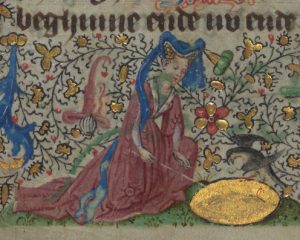
Baltimore, The Walters Art Museum, MS W.782, folio 15r. Van Alphen Hours. Scrying, Perchance? Image via Creative Commons.
This Spring, the cancellation of 2 of our major events planned for this year, and intended to take place in mid-March and mid-May, produces perforce a redirection of energies and activities. Call it “Regrouping”.
We report updates.
1. Our 2020 Spring Symposium: “From Cover to Cover”
Planned for 13–14 March at Princeton University
But Cancelled or Postponed
As preparations were proceeding apace, the event was cancelled by Princeton University — along with other events — on 9 March, in response to growing concerns for the spread of COVID-19 on a global scale. Although at short notice, it was possible swiftly to cancel reservations for the venue, catering, and other services before participants had begun their journeys.
What We Planned
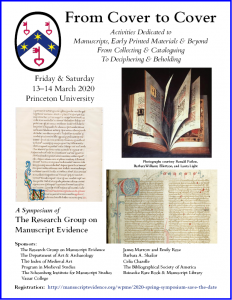
2020 Symposium Poster 2
We aimed to consider, “From Cover to Cover”, activities dedicated to manuscripts, early printed materials, and beyond, from collecting and cataloguing to deciphering and beholding. We prepared to gather specialists, teachers, students, and others engaged or interested in activities such as “Collecting, Curating, Conserving, Cataloguing, Deciphering, Reading, Reconsidering, Editing, Teaching, Displaying, Accessing, Beholding, and More”.
The focus was designed to center primarily upon medieval and early modern materials, both Western and non-Western. The presentations would include reports of discoveries, work-in-progress, cumulative research, and collaborative projects by specialists from multiple centers, including independent scholars and younger scholars.
Included were workshops over original materials in manuscript and early print, a demonstration of materials and processes for medieval scripts, discussions about databases devoted to manuscripts and rare books, and sessions addressing multiple activities approaching medieval, early modern, and other textual resources. Subjects would span a wide range geographically and chronologically, and take care to attend to the material and bibiographical evidence.
What We Can Do
There are requests for rescheduling the Symposium, or parts thereof, when conditions might permit.
Meanwhile, we can publish the Symposium Booklet. At the time of cancellation, it had come close to completion for printing and distributing at the event and then afterward, as is our custom. For example:
For all these and our other Booklets (see our Publications), the Research Group on Manuscript Evidence is the nonprofit publisher and distributor. The design and layout conform with our Style Manifesto and employ our own digital font Bembino .
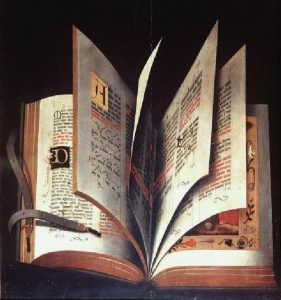
Florence, Galleria degli Uffizi, Anonymous, Still Life of an Illuminated Book, German School, 15th century. Image via Wikimedia, Public Domain.
The new 44-page Symposium Booklet contains the 2020 Symposium Program, Abstracts of the Papers and Masterclasses, and a set of accompanying Illustrations (some published for the first time). The Booklet includes corrections and revisions offered by several of the authors as we completed the layout and editing, after the cancellation of the event.
It is the longest so far of all our Symposium Booklets. The 2019 Booklet for “The Roads Taken” has 28 pages, and the 2016 Booklet for “Words & Deeds” has 24 pages. Only the Booklet for our multi-lingual digital font Bembino is longer, at 56 pages, including all the font tables for the different styles and languages. That Booklet and the font itself (now in Version 1.6) are freely available for download and use (commercial use included). Here: Bembino .
Our illustrated 2020 Spring Symposium Booklet is likewise freely available for download. As with other cases, for your convenience, we make it available in 2 versions, which may suit different printing arrangements, as wished. The versions are:
- printable as double sheets (11″ × 17″) which can be folded into the booklet, nesting the bifolia within each other
— a design which does not require staples for closure and perusal
2020 Spring Symposium as a Foldable Booklet
We thank our hosts, sponsors, contributors, owners and donors of images, editor, copy-editor, and layout designer. The publication is our gift to all who aimed to participate in the event and to follow its ‘ripples’ after the accomplishment of the Symposium. We offer it as a ‘souvenir’ of what our contributors, and the spirit of generous participation, intended for the event.
While we may explore plans to reschedule the event, or its parts, in some way or ways, the Booklet stands as a place-holder, and as a vivid glimpse of what could be and, indeed, can be. The gathering energy and enthusiasm for the event, as the weeks and days advanced toward it, remain a testimony to the constructive collective spirit which inspired it.
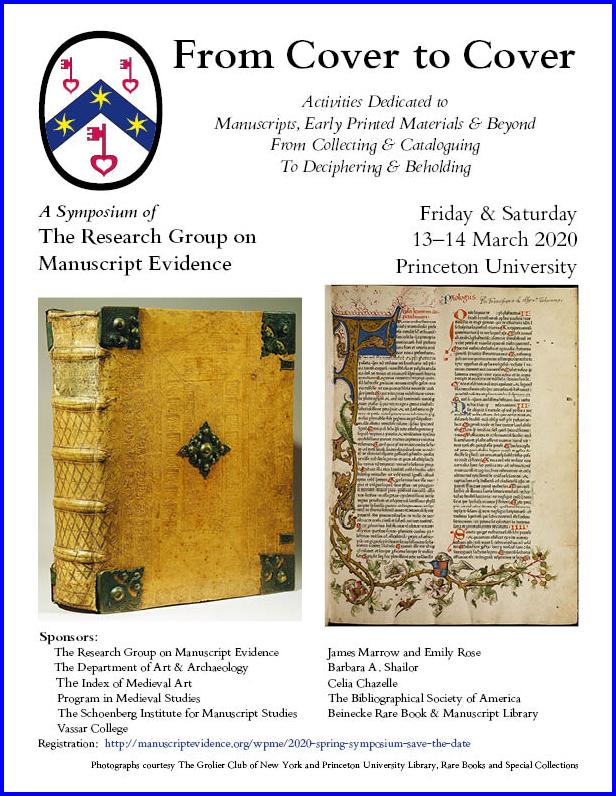
2020 Symposium Poster 1
_____
With these observations, I am reminded of the Motto which I chose, years ago, for the 2-volume Illustrated Catalogue, co-published by the Research Group on Manuscript Evidence.
For Books are not absolutely dead things,
but doe contain a potencie of life in them
to be active as that soule was whose progeny they are;
nay, they do preserve as in a violl the purest efficacie and extraction
of the living intellect that bred them.
John Milton, Aeropagitica (1644)
Perhaps same as it ever was.
_____
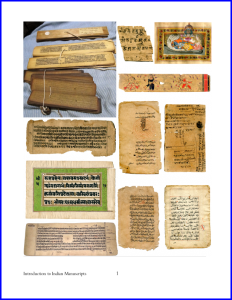
Cover Page for Sorenson (2020 Spring Symposium Paper as Draft for Comment)
P. S. Already one of our speakers, David W. Sorenson, has provided a draft version of his intended Symposium Paper for feedback. It expands the Abstract which appears in the 2020 Spring Symposium Booklet.
The paper provides “A Quick Introduction to Indian Manuscripts for the Non-Specialist”, with examples and illustrations.
With permission, we offer here his pdf.
Please contact us with your questions or suggestions. (Contact details below.)
*****
2. Our Activities at the 55th International Congress on Medieval Studies
Planned for 7–10 May at Kalamazoo
But Cancelled or Postponed
On 17 March, this year’s International Congress on Medieval Studies in May was cancelled, and with it all the activities which we were to sponsor and co-sponsor there, including Sessions and other meetings. The Congress organizers declared that “We invite the organizers of sponsored . . . sessions approved for the 2020 Congress to re-propose them for the 2021 congress. If proposed, they will be approved automatically”.
Unlike some organizations, who have declared this intention to re-present for the 2121 Congress, we do not know automatically if such a course would be appropriate for us, or for each and every one of our sessions. Time will tell.
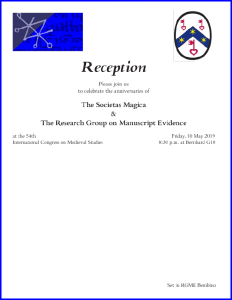
2019 Anniversary Reception Invitation.
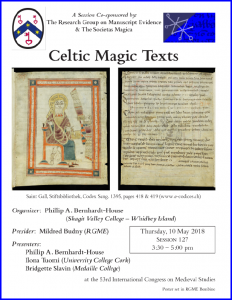
2018 Poster
The cancellation came in time before all reservations for the journey had been set into place. Because our customary year-long preparations for the Congress had not reached the last weeks of its approach, we had not yet prepared the customary Posters for our Sessions or the Invitations to the Reception and Business Meeting, nor had the Agenda for that Meeting yet been drawn up. Posters for previous Congresses show the standards.
However, we did in place have a series of posts on our website (You Are Here) announcing the plans for our 2020 Congress Activities, in stages with updates:
- the Call for Papers for our approved Sessions, with descriptions of their aims and with selected Images (poster-worthy when the time would come) to exemplify their subjects and scope
- the 2020 Congress Program, with the authors and titles of the selected Papers for each Session — including a permitted extra Session, given the strength of the responses to the Call, for our proposed Session “Seal the Real”
- the 2020 Congress Program Announced, with the times and rooms assigned by the Congress Committee for our Program Activities, and with some of the Abstracts for the Papers.
In keeping with custom, we had begun, one by one (starting with the New Year), to post the Abstracts, as a foretaste for the presentations and discussions to come.
The cancellation of the Congress brought these stages to a halt, for a while, during which time we turned to other tasks — including the on-going follow-up from the cancellation or postponement of our Spring Symposium, and the completion of its Booklet.
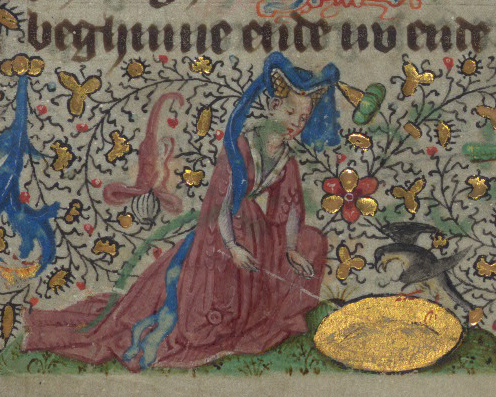
Baltimore, The Walters Art Museum, MS W.782, folio 15r. Van Alphen Hours. mage via Creative Commons.
What We Planned
We prepared for 5 Sessions with Papers, an Open Business Meeting, and a Reception.
These resemble the numbers and sorts of our activities in recent years at the Annual Congress. For example:
This year’s plans also involved our 2 co-sponsors in recent years for Sessions and/or Receptions.
A. Sessions
We prepared for 5 Sessions this year.
3 Sessions Sponsored by the Research Group on Manuscript Evidence
1–2. Seal the Real: Documentary Records, Seals & Authentications
organized by Mildred Budny
Part I. Signed & Sealed
Part II. × Marks the Spot
3. Prologues in Medieval Texts of Magic, Astrology, and Prophecy
organized by Vajra Regan
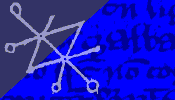
Logo of the Societas Magica
2 Sessions Co-Sponsored with the Societas Magica
in the 16th year of this collaboration
4–5. Revealing the Unknown
organized by Sanne de Laat and László Sándor Chardonnens
Part I. Scryers and Scrying in the Middle Ages and Early Modern Period
Part II. Sortilège, Bibliomancy, and Divination
B. 2020 Open Business Meeting of the Research Group on Manuscript Evidence
1-Page Agendas customarily provided at the time. This year we send it out already. (See below.)
_____
P. S. Part of Mildred Budny’s on-going research on the subject of seals and signatures, which would have figured in her Response to Session II of our “Seals” Sessions, now appears on our blog, Manuscript Studies, presenting Preston Take 2. (See the Contents List for the blog, as more discoveries await publication.)
_____
P. P. S. It is not lost on us that some of our planned Sessions for 2020 were to consider aspects of the history of divinatory skills across time and place. But when we collectively chose these, as well as other subjects, last year for our sponsored and co-sponsored Sessions this year, it was not easy to guess then that this year’s Sessions would not take place, after all, at their appointed time and place.
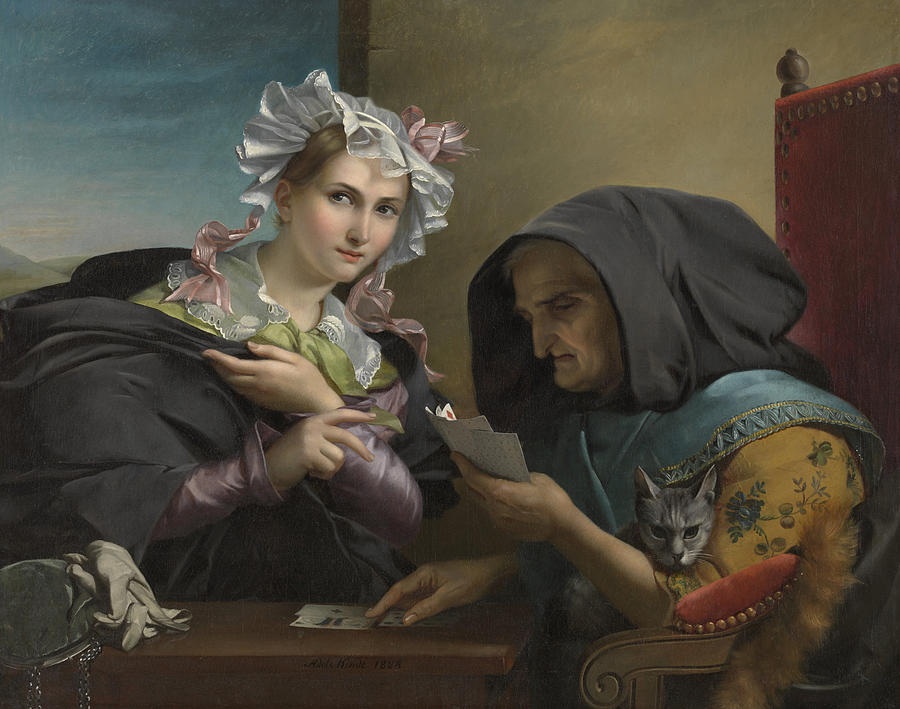
Adèle Kindt (1804–1884), The Fortune Teller (circa 1835). Antwerp, Koninklijk Museum voor Schone Kunsten. Image via Wikimedia Commons.
What We Can Do
A. Abstracts for the 2020 Congress Papers
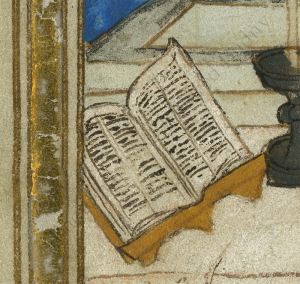 Our custom is to post on our website the Abstracts for the Papers of our Sessions at the Congress. (See our Abstracts for Congress Papers.) This year is no different.
Our custom is to post on our website the Abstracts for the Papers of our Sessions at the Congress. (See our Abstracts for Congress Papers.) This year is no different.
In the winter of 2019–2020, we had begun to post the 2020 Abstracts, one by one, as is our custom. They are linked to our announced Program: 2020 Congress Program Announced. The Abstracts function as a foretaste of the ‘Menu’ of the Sessions, and can provide a record of their subjects, aims, and scope of the presentations.
Already in earlier years (as with the 2016 Congress and the 2014 Congress), as a sign of appreciation, we chose to adopt the tradition of posting Abstracts even when a contributor was unable to travel to the Congress and to present the paper in person. The publication of such Abstracts states that, although proposed, accepted, and scheduled within the Session and Congress Program, the paper was not, in the event, presented.
Before March 2020, only once before, in more than 30 years of activities in many centers in the United States and elsewhere (see our Events and Congress Activities), has the Research Group had to cancel an event itself. That case was only 1 Session among 7 sponsored and co-sponsored Sessions at the 48th International Congress on Medieval Studies in May 2013.
This year, after the cancellation of both our 2020 Spring Symposium (see above) and the 2020 Congress, we first turned to completing the Symposium Booklet, and then to completing the posting of the 2020 Abstracts.
Those tasks are now accomplished. For these Congress Abstracts, see
For the Symposium Booklet, see
Thus we honor the intentions of our participants and their readiness to contribute to our events.
Next, we might turn to contemplating further activities, and perhaps rescheduling some of these ones.
[Update: In the summer and autumn of 2020, we advance with planning to hold the same Sessions, albeit with a few changes, at the 2021 Congress. See the 2021 Congress Program in Progress.]
B. Agenda for the 2020 Business Meeting
Meeting to be rescheduled: Time and Place to be Determined
The Annual Agendas for our Open Business Meetings, customarily held at the International Congress on Medieval Studies, remain available for consultation.
These 1-page statements serve as concise Reports for our Activities, Plans, and Desiderata. After the Meetings, the Abstracts are available for download on our website. Some of them remain among the most popular downloads here.
Normally, the Agenda is presented at the Meeting. This year, we send it out ahead of time. It incorporates the updates of Spring 2020 and their constructive measures.
It is not yet clear when this year’s Meeting, which had to be postponed, will take place. Under present circumstances, we may contemplate a virtual meeting, say via online conferencing in some form.
Please let us know if you wish to participate in the Meeting. We invite your comments, questions, and suggestions. (See below.)
C. More
We thank all our contributors to the 2020 events. The continuing momentum for such activities is a tribute to you all.
Please Contact Us with your questions and suggestions, for example to items on our 2020 Agenda.
For updates, please visit this site, our News & Views, and our Facebook Page .
For our nonprofit educational mission, with tax-exempt status, your donations in funds and/or in kind (expertise, materials, time) are welcome. Join us!













 Our custom is to post on our website the Abstracts for the Papers of our Sessions at the Congress. (See our
Our custom is to post on our website the Abstracts for the Papers of our Sessions at the Congress. (See our 
